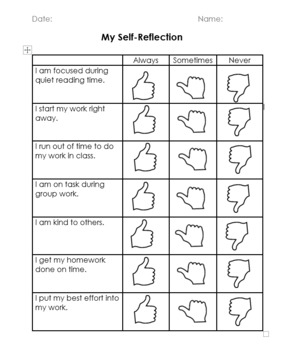

Students don’t need to take a weekly quiz. However, in a PBL unit, you don’t need to stop the project to take an assessment. The truth is I had assumed that assessments were things you “give” and “take” not an action that you do. My students weren’t engaged in any kind of self-reflection. But these quizzes were for me and not for the students. I had been using a short 15-minute multiple choice test every Friday as a way to gather data to ensure that students were still learning the content during their projects. I think I told him something vague about the need to assess the learning and make sure that the project he was working on led to mastery of the standards. I was in my second year of doing project-based learning when a student sighed and asked, “Why do we need to stop?” Having a visual representation of self-reflection can be motivating.I still remember the moment. Celebrate your authentic self and the ways you stay true to who you are. Make a self-reflection board: Create a self-reflection board of positive attributes that you add to regularly.Writing down your thoughts in a journal can help.


It can be helpful to look back at your responses, read how you handled things in the past, assess the outcome, and look for where you might make changes in the future. Keep a journal: Journaling your thoughts and responses to these questions is an excellent vehicle for self-expression.Be curious about yourself and be open to whatever comes up. Ask yourself open-ended questions: Start off by asking yourself open-ended questions that will prompt self-reflection, such as: “Am I doing what makes me happy?” “Are there things I’d like to improve about myself?” or “What could I have done differently today?” “Am I taking anything or anyone for granted?” Notice what thoughts and feelings arise within you for each question and then begin to think about why.It can also help you hold yourself accountable for the goals you’re working toward. It can help you evaluate your actions and recognize personal responsibility. Greater accountability: Self-reflection can help you hold yourself accountable to yourself, says Francis.This can help you make sound decisions that you’re more comfortable with, says Francis. Understanding yourself better can help you evaluate all your options and how they will impact you with more clarity. Better decision-making skills: Self-reflection can help you make better decisions for yourself, says Wilson.It can also help reduce cognitive dissonance, which is the discomfort you may experience when your behavior doesn’t align with your values, says Francis. This can help ensure that your words and actions are more aligned with your core values, Wilson explains. Deeper alignment with core values: Self-reflection can help you understand what you believe in and why.Understanding what you’re feeling can help you express yourself clearly, honestly, and empathetically. Improved communication skills: Self-reflection can help you improve your communication skills, which can benefit your relationships.This can help you feel more grounded and in control of yourself, says Francis. Greater sense of control: Self-reflection involves practicing mindfulness and being present with yourself at the moment.It helps you recognize and understand your own emotions, as well as the impact of your emotions on your thoughts and behaviors. Self-awareness is a key component of emotional intelligence. Increased self-awareness: Spending time in self-reflection can help build greater self-awareness, says Wilson.


 0 kommentar(er)
0 kommentar(er)
